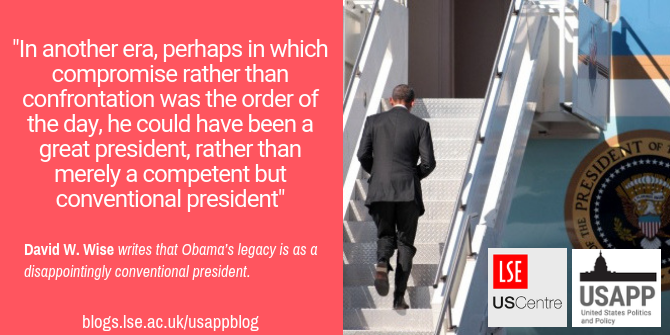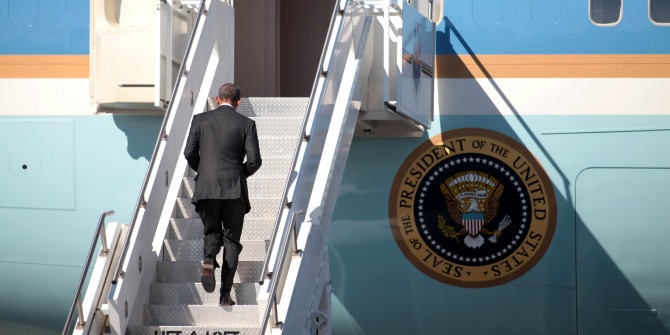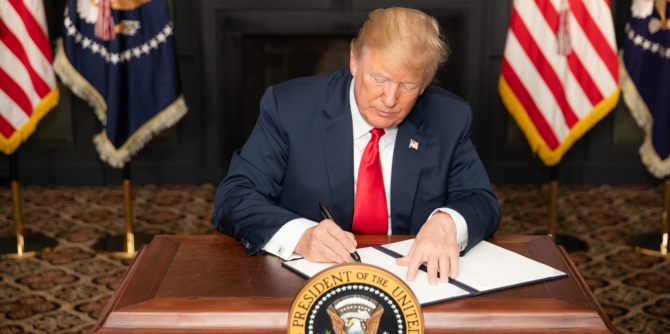 More than a decade on from his historic election victory to become the first African American president, to many, in light of President Trump’s election, Barack Obama is the epitome of what a president should be. David Wise writes that despite the 44th president’s electoral successes, President Obama stumbled in areas many Progressives hold dear, such as continuing drone strikes, not taking the big banks to task following the 2008 financial crash, and by failing to consolidate his electoral coalition before pushing his signature Obamacare reform.
More than a decade on from his historic election victory to become the first African American president, to many, in light of President Trump’s election, Barack Obama is the epitome of what a president should be. David Wise writes that despite the 44th president’s electoral successes, President Obama stumbled in areas many Progressives hold dear, such as continuing drone strikes, not taking the big banks to task following the 2008 financial crash, and by failing to consolidate his electoral coalition before pushing his signature Obamacare reform.
The current struggle between the ascendant progressive and establishment wings of the Democratic Party has its roots in past disappointments. Bill Clinton attained his presidency by steering away from the party’s New and Fair deal roots to embrace big donors from the financial world and business. Barack Obama, who ran as an agent of change, too often adopted policies from both of his immediate predecessors, George W. Bush and Bill Clinton. In 2016 the party offered warmed over Clintonism served up by a wholly ineffective candidate. Now, Progressives are saying loud and clear that they will not be taken for granted and expected to digest more leftovers out of the view that they have no choice given that Trump will be the only other item on the menu.
The truth is that Barack Obama was a good president – in a less contentious environment he could have been a great president – but he was also a disappointment. The first signs of this were after gaining the nomination on the wings of grass roots support and small donors – in a campaign whose slogans were “Yes We Can” and “Change You Can Believe In” –he abandoned his pledge to run his general election campaign on public financing in favor of going the route of big donors.
As the first African American nominee of a major political party and then as president, Obama came into the office with pressures and expectations unique to that fact. Some people criticized him out of bigotry and others put off by the almost messianic expectations and perceived elitism of some of his followers. Obama made some missteps early on that played into the hands of his detractors from the Greek columns at his acceptance speech to what was essentially a large campaign rally in Berlin, a spot from which only sitting presidents – JFK, Reagan – had delivered memorable addresses. But the award of a Nobel Peace Prize only months into office sent a message of hubris and elitism. Obama would have been well-advised to decline the honor with a statement that although he would hope to one day earn it, he had not done so yet.
Unfortunately, in his eight years in office, President Obama never did earn that prize. His efforts to wind down the conflicts in Afghanistan and Iraq and to close Guantanamo were halting or dashed. Although he did seek peaceful resolutions in dealing with potential conflicts with Iran and China through a successful international nuclear accord on the former and through a pivot to Asia and a trade agreement (TPP) to counterbalance China (both foolishly abandoned by the current administration). His administration nevertheless committed the same mistakes from the Iraq War in the regime change brought about though force in Libya. Another error was in encouraging demonstrations in Maidan Square in Ukraine contrary to an agreement for a peaceful transition that had just been negotiated. Both actions generated distrust and enmity of the Russians with whom he had pledged a “reset” upon taking office. Most distressing, for a Nobel laureate, was not merely the continuation but the acceleration of the policy of drone warfare and targeted assassination described in the best-selling book Dirty Wars.
“Barack Obama” by Gage Skidmore is licensed under CC BY SA 2.0
Despite being the first president since 1984 (and the first Democrat since 1936) to win a popular majority twice, President Obama had shortcomings as a political leader. He abandoned grass roots programs for building the party nationally and shifted the focus to Organizing for America an organization established to promote Obama himself. Instead of highlighting job creation and the 2008 financial crisis without which he would not have won and using his majority to push through an aggressive stimulus program he compromised and got half a loaf. In 2008 the Republicans appeared bankrupt as a governing party having embarked on one of the major foreign policy fiascos in American history (the Iraq War) and the greatest financial crisis since the Great Depression. As the country’s financial system teetered on collapse and the jobless rate soared Obama should have focused on jobs and nation building at home.
However, instead within months into Obama’s first term he gave the GOP a ruse (“Obamacare”) that they used as a rallying cry. Instead of focusing on jobs and pocketbook issues and hammering home for the voters the many failures of the Republican program, within just two years the Republicans won back both Houses of Congress.
The fact that the Republicans charged Obama with “socialism” when he proposed a healthcare program that they had themselves developed in the 1990s and that Mitt Romney has enacted when he was governor of Massachusetts showed the the Obama team did a poor job of message control and did not understand that the party opposite had no interest other than in doing anything necessary to win back power. Health care reform was and is a very important issue, but Obama would have had been in a better position to implement a more ambitious program had he first consolidated the Democratic Party’s majorities before making that move.
Further, instead of taking strong action to address the causes of the financial crisis Obama turned around and appointed people from the Clinton administration who had played some early role in setting the stage for the crisis in opposing regulation of derivatives. Despite massive fraud, not one top official of a major financial or bond rating agency went to jail under Obama’s Department of Justice. It is not hard to understand the popular discontent that this engendered. As a result, during the Obama years the Democratic Party lost 1,000 elected positions across the country down to the state level as well as majorities in Congress. The election of Donald Trump as his successor was the final blow.
This article is written out of disappointment, not denunciation. Obama – despite the divisiveness and vitriol that the right projected on him – sought to be a uniter and a healer. In another era, perhaps in which compromise rather than confrontation was the order of the day, he could have been a great president, rather than merely a competent but conventional president. During his tenure the economy recovered from the brink, no troops were committed to new disastrous wars, he did attempt to address the problem of the large number of people who lacked health insurance and he conducted himself with the dignity that the office deserves. However, the large electoral vote majorities that propelled him into office had different expectations of what he would do in office and the nation required something more. In the next election, progressives will demand nothing less.
Please read our comments policy before commenting.
Note: This article gives the views of the author, and not the position of USAPP– American Politics and Policy, nor of the London School of Economics.
Shortened URL for this post: http://bit.ly/2WdV8cz
About the author
David W. Wise
David W. Wise is a frequent commentator on foreign, national security and public policy. He was elected as a delegate to the 1972 Democratic National Convention, at age 19, and was elected again in 1976. In 1980 he served on the convention’s Credentials Committee. He holds a graduate degree from The Fletcher School of Law and Diplomacy at Tufts University.







